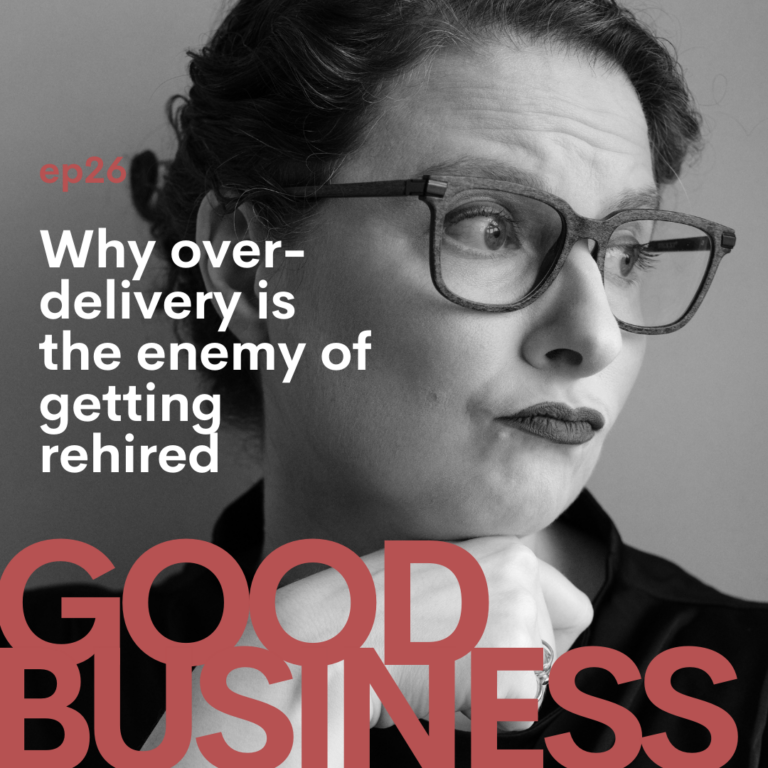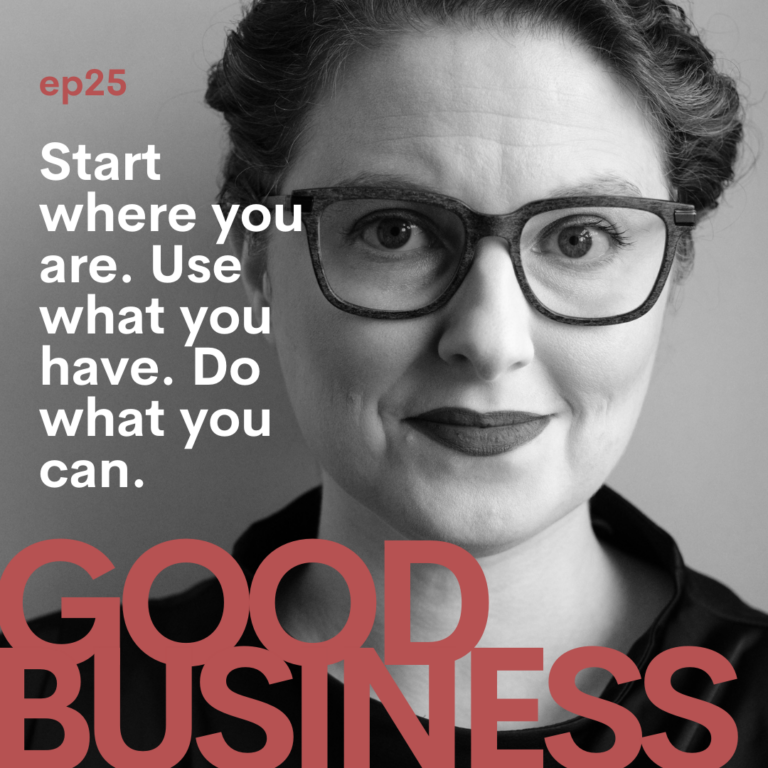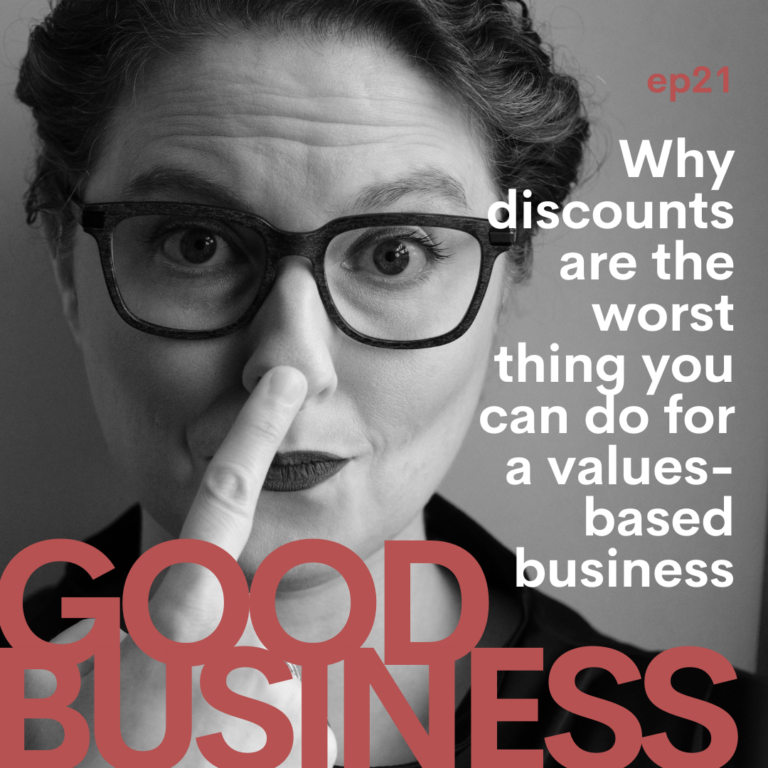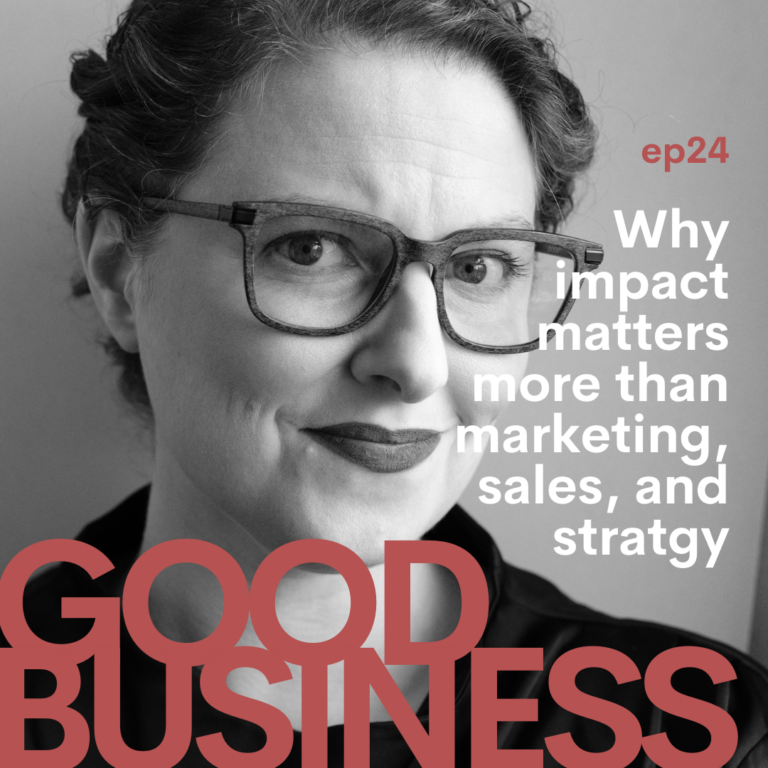In this episode, I’m going to walk you through how to think about establishing your stakeholders, the steps you need to take to do so, and how to make decisions based on who they are without compromising those big fat dreams we’ve been talking about.
Episode Transcript:
I’m Illana Burk, CEO of Your Life’s Workshop, coach to entrepreneurs and solopreneurs across dozens of industries and host of Good Business. With nearly 20 years experience helping hundreds of clients create profitable, ethically driven and sustainable businesses based on their life’s work, I’m here to teach you how to do great work, make great money, and make a positive impact without feeling like you need a shower afterwards.
Hey everybody. Today’s episode is all about, not you. It’s about the people who affect and will be affected by your business and why they are critical to your success. See, while you’re over there building your big, beautiful, magical dream, the people in your life will still be out there just chilling, living their lives, setting their own goals, meeting their own needs, and relying on you to be, well, you. If you make the massive mistake of just plowing ahead without really truly understanding exactly who the people are who you need the most buy-in from, you’ll fail. Or worse, you’ll fuck up the relationships that matter most to you, both the ones that you have and the ones that you haven’t even thought about yet. In this episode, I’m going to walk you through how to think about establishing your stakeholders and the steps you need to take to do so and how to make decisions based on who they are, without compromising those big fat dreams we were talking about. It’s going to be more fun than it sounds, I promise.
First, let’s do this. Today, the first thing I want you to do is to make a list of everyone you can think of who might be affected by the biggest version of your work that you can think of. The first step is to think about a rough picture of your biggest vision. Are you a traveler? Do you lead the masses? Work one on one with a few people? Try to get at least a rough picture of where you see yourself when everything works out perfectly, and you end up with the business of your dreams. The second step in figuring all this out is to start with the easy people in your life. The tightest circle. Your spouse, your friends, your kids.
Next, think about the big vision and work backward. Who will you need to help you get there, and who will support you along the way once you do get there? This can be mentors; this can be coaches; this can be an accountant; this can be a bookkeeper; this could be marketing help. Figure out what you’re going to need to get to that thing. Your stakeholders include both those who are in your life now and those who will be affected by and impacted by your business in the future.
Next, we’re going to talk about how to think through your priorities based on who matters in your life. Knowing this will help you set agendas, establish a strategy, and not fuck up your life while you’re chasing your big business dreams. Here’s what I mean. If your spouse and your kids are the people who matter most to you, and you’re planning for a new product launch or something, and you fail to make sure you still have time to pick up your kids at school and have an occasional date with your spouse, then the people in your life will stop being your supportive advocates and will start feeling like they are killing your dreams. And that will be your fault, not theirs.
See, entrepreneurs are notoriously selfish people. We get single-minded. We become driven, and basically, everyone in our entrepreneurial circles validates this and tells us that we should care only about this because our business needs every ounce of blood, sweat, and tears, and it’s fucking false. You can totally build a business and not have your marriage fall apart and not have your kids hate and resent you. It is possible. I’m living proof. It’s possible. Likewise, if you expect your business can grow without putting in any external stakeholders needs front and center, when you do have time to focus on them, you’ll enjoy the misery of defeat. I promise you that. You can’t grow without putting the people who matter to your business – without putting their needs – upfront. Then what the fuck is the point? You won’t succeed.
You need to be ready and able to create balance. This might mean you have to say no to good ideas because you don’t have the room or it might mean that you occasionally have to ask for help from your internal people to help your external ones or vice versa. I’ve had moments where I ask a client to forgive me, but I’m going to have to cancel because my four-year-old needs me more than they do. That’s how you ask your external stakeholders how to help you help your internal ones so you can continue to be strong for both of them. Chew on that.
Then do this next. First, look at your time. What does your life schedule look like with the stakeholders you’ve established? Where are the hours that have to be devoted to your internal stakeholders and your external ones? What time-based commitments are you unwilling or unable to relinquish for the sake of your business’s growth? Really look at it because I promise you there are things you’re not to want to miss even though you’re trying to build your dream. Then there are the things that you absolutely cannot miss. You need a root canal. You have to get a fucking root canal. So think about how much time and energy the most successful version of your business might need. It sounds simple, this one, but it isn’t. If you have a full client roster, how much time will you need to fulfill your obligations to them? How accessible will you be during off times? What kind of communication boundaries do you need to set up to make sure you don’t mess up? How much help do you anticipate having?
By the way, this is one where I love hearing new entrepreneurs fuck this up completely. I shouldn’t say I love it. It’s more like I’m amused by how many people get this wrong. They’re like, “Well, I’ll just hire out my social media, and I’ll just hire out this, and I’ll just hire out that.” Um, yeah, no, you won’t. You won’t hire all those things out. You’ll hire some of them out, but by the time you’re successful, you’ll realize a lot of that stuff is not as hard as you think it is right now and it’s not as time-consuming, and you won’t want to pay for it. Then when you get successful, sometimes you will want to pay for it, and you’ll have no idea how much scope, how much time it will take to manage those people, how much effort it takes to actually do the work that they need. You don’t know all that information yet, so you need to make sure you’re always building in buffers.
The most important thing, again, is a balance. It’s all about balance. Notice where you’re going to need to create balance. Notice that, let’s say you’re somebody who takes forever to do bookkeeping, you’re going to need to hire a bookkeeper and you’re going to also need to know that in the meantime, that’s going to swallow a lot of extra time for you before you can afford to hire one.
You have to think through all these different components of your work and of your internal stakeholders like your spouse, your kids, your friends, and the relationships that matter to you, that you don’t want to sacrifice for your big dream. Or, you need to at least be ready to say to them, “Hey, for the next year I’m going to be a shitty friend, and I am hoping you can be okay with that because I need your support and this is how you can support me in that. You can be forgiving when I don’t make it to dinner parties. You cannot ask me to do some of the things that I used to do. You can help me by supporting me when I want to hire a housekeeper because I can’t do the stuff around the house that I used to be able to do.” That’s how you verbalize and vocalize your preferences and your desires.
You can do this. In our next episode, we’re going to talk about the next steps of how to market effectively with all of this in mind. Thanks for joining me, everybody. We’ll see you all next time. Bye.
Thanks so much for hanging out with me today. For more information, visit www.thegoodbusiness.co or www.lifesworksdev.wpengine.com.
More Episodes
Why overdelivery is the enemy of getting rehired | GB26
Today’s episode is all about why over-delivering is a really good way to not get asked back for more work. We all think doing our best and giving more than people asked for is a good thing. And in some ways, it is. Things like adding extra value to something you do is fine. What I’m talking about is when you completely blow the scope of what was asked of you out of the water. It’s one of the hardest things to identify when you’re trying to figure out why no one seems to hire you twice.
Market visibility for people who care about other people | GB23
Today is a branch off of our stakeholder conversation. If you listened to that episode, you should have a clear picture of exactly who matters to you and your work and why, as well as how much time you have for your work without sacrificing what those VIPs need and expect from you. Next up, we talk about exposure, protection, and the responsibility you have to those who matter most.
Start where you are. Use what you have. Do what you can. | GB 25
Today’s episode of The Good Business Podcast is all about my very favorite quote in the whole world. “Start where you are. Use what you have. Do what you can.” by Arthur Ashe
Pricing Basics: Why discounts are almost never a good idea | GB21
Today’s episode dovetails on our last one, where we talked all about how your value isn’t determined by your price tag. Today, we’re talking about discounts. First, we’ll talk about why businesses offer them, what their purpose is and when they ARE a good idea. Then we’ll talk about why they are probably a bad idea for you and what to do instead.
Why impact matters as much as marketing, sales, or strategy. Maybe more. | GB24
Today’s episode is less of a lesson than recent episodes. Instead, today we’re making a case for a topic we’ll be talking a LOT more about in the future: IMPACT. What it is. Why it matters. And how to pay attention to it.
Pricing Basics: Your value is not attached to your price | GB20
This episode breaks down the popular trope that if you don’t charge a lot, people won’t value your work. First, we talk about the conditions that make this a common piece of advice. Then I lay out why this is complete crap for certain kinds of businesses. Finally, the episode wraps up with a brief primer on how to think about pricing in a way that serves your people AND your bigger dreams for yourself.






